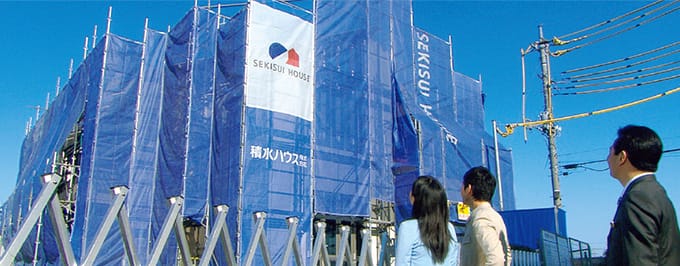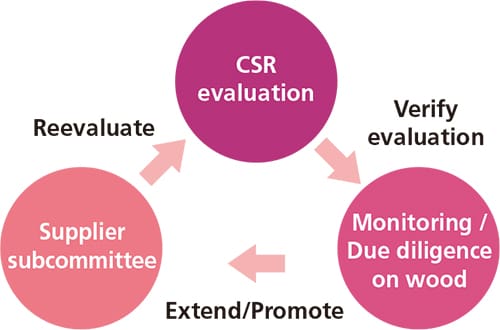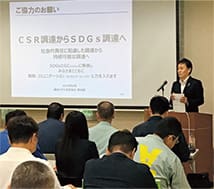
Pursuing Customer Satisfaction through Our Value Chain Activity report ②
Meticulous supply chain management for material procurement
![]()
![]()
![]()
![]()
![]()
New form of CSR evaluation
→ From CSR procurement ahead to SDG-based procurement
Activity report
From reviewing CSR evaluations to SDG-based (sustainable) procurement
To encourage our suppliers in their socially responsible efforts, we carried out CSR evaluations using a check-sheet method in FY2017 and FY2018. In FY2018 we established CSR Procurement Guidelines and required suppliers to submit a consent form to ensure that they agreed with the intent of the guidelines in an effort to reappraise and establish our sustainable procurement strategy going forward.
Following our signing of the United Nations Global Compact in 2018, Sekisui House joined the Supply Chain Working Group of the Global Compact Network Japan (GCNJ). In FY2019, we switched from using an in-house CSR assessment check sheet to carrying out evaluations based on the standards set forth in the more comprehensive GCNJ Self- Assessment Questionnaire (GCNJ SAQ*). The questionnaire has nine categories of procurement standards with items not covered by the previously used check sheet, including corporate governance and supply chain questions.
In February 2020, we reorganized the former Materials Department into the Procurement Department, and significantly changed the organizational structure involved in production and procurement.
Through such actions, we are making the shift from procurement methods of the past to an active participation in the supply chain (SDG-based procurement) to work toward building a sustainable society.
- SAQ: The Self-Assessment Questionnaire is a self-diagnosis tool that a company uses for analyzing its actions.
GCNJ SAQ themes and topics (from CSR Procurement Guidelines)
| Theme | Topic |
|---|---|
| 1.Corporate governance | Compliance with laws and regulations; Establishment of a CSR promotion system; Establishment of internal controls; Establishment of a business continuity planning (BCP) system; Establishment of a whistle-blower system; Dispatch of CSR-related information inside and outside the company |
| 2.Human rights | Basic attitude; Respect for human rights and prohibition of discrimination; Avoidance of complicity in (or contribution to) human rights abuses; Respect for indigenous peoples and local communities |
| 3.Labor | Basic attitude; Prohibition of discrimination in the workplace; Provision of equal opportunities to employees regarding human resources development; Prohibition of inhumane treatment; Payment of fair wages; Fair application of working hours; Prohibition of forced labor; Prohibition of child labor; Respect for the religious traditions and customs of the country of operation; Recognition of and respect for freedom of association and the right to collective bargaining; Proper management of employee safety and health |
| 4.Environment | Basic attitude; Management of chemical substances; Control and reduction of waste water, sludge and air emissions; Sustainable and efficient utilization of resources (energy, water, raw materials, etc.); Reduction of GHG (greenhouse gases); Identification, management, reduction, and responsible disposal or recycling of waste; Initiatives related to biodiversity |
| 5.Fair business practices | Basic attitude; Establishment of appropriate relationships with governments and public officials in countries where business activities are conducted; Prevention of the giving and receiving of improper advantages with customers and trade partners; Prevention of competition law violations; Rejection of relationships with antisocial forces/organizations; Prevention of unauthorized use of intellectual property and of illegal reproduction of copyrighted works; Services for responding to complaints from outside the company and for consultations; Prohibition of insider trading; Prohibition of acts with conflicting interests; Import and export control |
| 6.Quality and safety | Basic attitude; Ensuring product and service quality and safety; Appropriate response to product and service accidents and the circulation of defective goods |
| 7.Information security | Basic attitude; Defense against attacks on computer networks; Protection of personal data and privacy; Prevention of misuse of confidential information |
| 8.Supply chain | Basic attitude; Use of raw materials not involved in conflict or crime (initiatives against conflict minerals) |
| 9.Local communities | Initiatives to reduce negative effects on local communities; Initiatives with local communities toward sustainable development |
Monitoring and due diligence to verify evaluations
We conduct monitoring of suppliers flagged by the results of the CSR evaluation through on-site interviews (to provide advice on evaluation standards and how to meet the standards). In FY2019 we conducted such on-site interviews for three suppliers.
Another area of increasing importance to us is related to climate change–reducing CO2 emissions in the production processes within the supply chain. We are therefore using the SAQ and other tools in a steady effort to achieve those reductions.
Additionally, as a construction company that uses a high volume of lumber, we recognize the particular need for rigorous participation in the procurement of large trees where infringement risks are high, so we conduct due diligence targeting approximately 50 companies that are major wood material suppliers. As necessary, we also conduct on-site inspections of logging areas at overseas producers upstream from our suppliers.
How supplier evaluation works

CSR supplier subcommittee seminars held to extend and promote SDG procurement

Supplier subcommittee seminar held to promote understanding of CSR efforts and SDG procurement
In the construction industry, which has so many small and medium-sized suppliers, we realize that building a sustainable supply chain involves more than simply a one-way evaluation of adherence to guidelines. It is indispensable to educate suppliers and provide advice.
For that purpose, in 2018 we set up a CSR supplier subcommittee under the CSR committee to conduct training on the importance of ESG management and related matters. We obtain the agreement of suppliers to ensure the effectiveness of the SAQ in supporting a sustainable supply chain. In FY2019 training seminars were expanded to the partner companies of our factories in addition to approximately 150 suppliers.
Sustainability Report 2020 TOP
Contributing to Health, Longevity and Wealth
Pursuing Customer Satisfaction through Our Value Chain TOP
Action policies ② Meticulous supply chain management for material procurement
Action policies ③ Enhancing production and distribution quality and improving operational efficiency
Action policies ④ Strengthening our workmanship and maximizing our construction capabilities
Basic concept & Action policies | Promoting Diversity
Basic concept & Action policies | Workstyle Reforms
Basic concept & Action policies | Human Resource Development
Independent Third-Party Assurance Report



